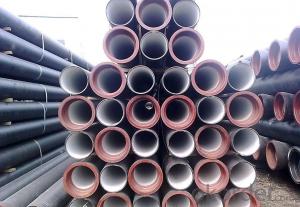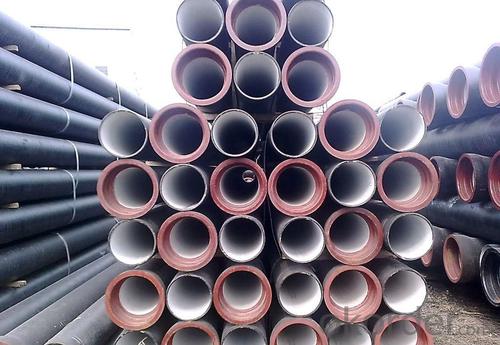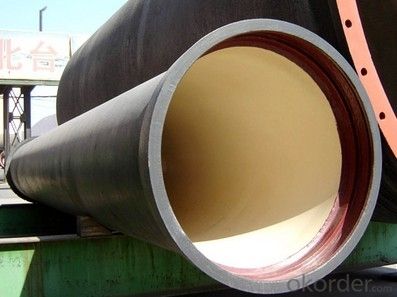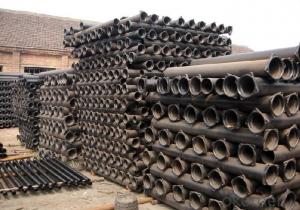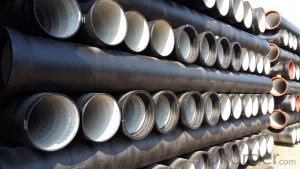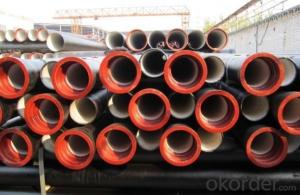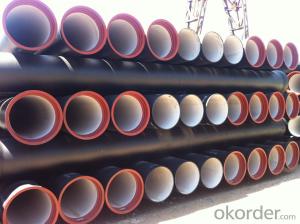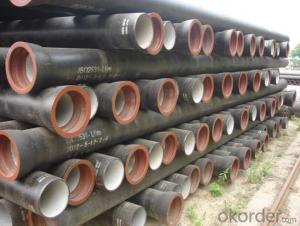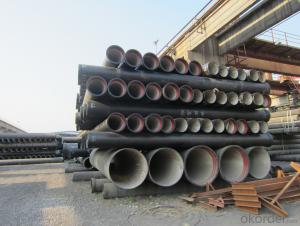Ductile Iron Pipe of China DN100-DN700 EN545/EN598/ISO2531 On Sale
- Loading Port:
- China main port
- Payment Terms:
- TT or LC
- Min Order Qty:
- 25 m.t.
- Supply Capability:
- 200000 m.t./month
OKorder Service Pledge
OKorder Financial Service
You Might Also Like
1,Ductile Iron Pipe Description :
1) Pipes confirm to ISO2531,K9 class,T type joint,6m long,with inside cements lining conform to ISO4179, outside Zinc spraying(130g/m2) and bitumen coating(70μm) conform to ISO8179.
2) Pipe ends: Spigot and socket ends, with 100% SBR rubber gaskets accoding to ISO4633
3) we can do third party inspection according to customer's request.
4) Our products have been sold to many international market,such as Middle East and South East Asia and Africa.
2,Main Features of the Ductile Iron Pipe:
·High yield strength
·High tensile Strength
·High corrosion resistance
·Pressure Resistence
·Anti-corrosion
·Installation is convenient
·Satisfy the highest hygienic standards
3,Ductile Iron Pipe Images:
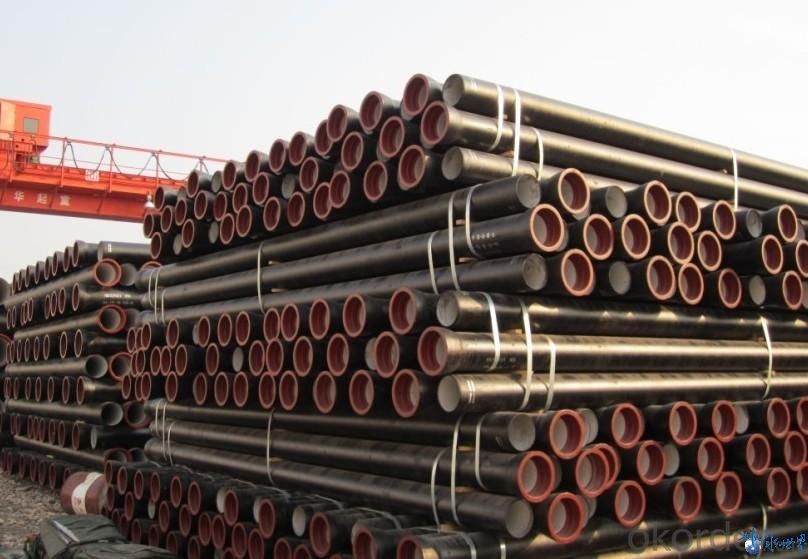
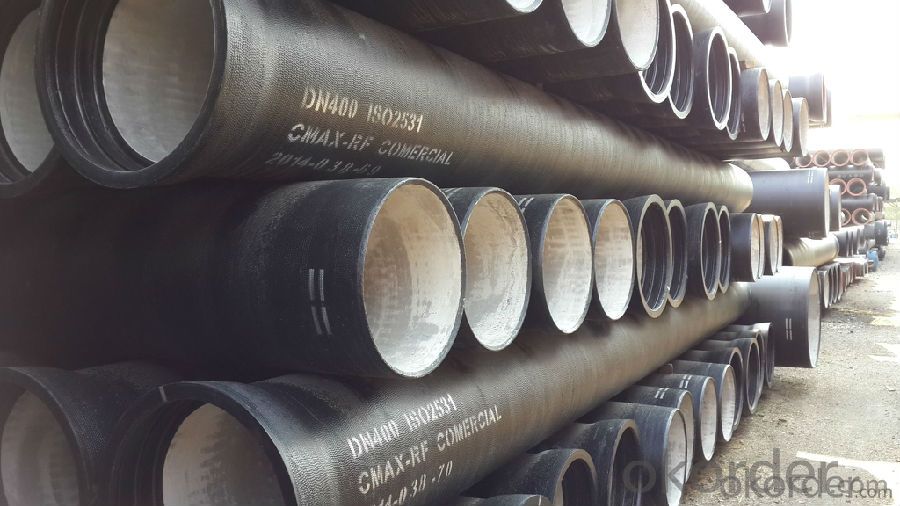
4. Ductile Iron Pipe Specification
Place of Origin: China (Mainland)
Model Number: DN80-1600 Length: 6M/5.7M/NEGOTIATED Standard: ISO2531 / EN545
Application: Potable/Sewage Water
Diameter: DN80-1600
Shape: Round
Hardness: 230 Pipe
Wall Thickness: standerd
Pull Strength: 420
Yield (≥ MPa): 300
Material: Ductile Iron water ductile iron pipe: SO2531 / EN545 DI pipe
Packaging & Delivery
Delivery Detail: 30-45 days
Specifications
ductile iron pipe:
1. DN80-DN1600mm (T-Type, Class K9)
2.effective length 6m/pc
3.comply with ISO2531/EN545/EN598
Internal lining: ductile iron pipes shall have an internal cement mortar lining in acc with ISO4179.
External coating: ductile iron pipes shall be externally coated with metallic zinc spray plus a further layer of resin painting to ISO8179.
Gasket: 100% SBR/NBR/EPDM rubber gasket in accordance with ISO4633.
Packing: ductile iron pipes from DN100 to DN300 be bundled with steel belts, others are in bulk.
Payment term: L/C, T/T.
Packing: In bulk vessel or in container
5.FAQ:
We have organized several common questions for our clients,may help you sincerely:
1.Q: Why would you choose ductile iron pipe rather than other pipe materials?
A:The reasons are obvious for that not only ductile iron pipe possesses the inherent strength and flexibility of ductile iron, combined with proven corrosion protection systems, but also the cost savings can be achieved from design to installation and commissioning.
2.Q:Why can you guarantee the inner of pipes can’t be corroded?
A: High alumina cement mortar lining and sulphate-resistant cement mortar lining. These two special linings are applicable to inner anti-corrosion for sewage pipes, improving resistance to erosion of the sewage components.
- Q: What is the average cost of ductile iron pipes?
- The cost of ductile iron pipes can differ based on factors like diameter, length, and location, resulting in varying averages. Typically, the price range for ductile iron pipes is $30 to $100 per linear foot. To illustrate, a 6-inch diameter ductile iron pipe that is 20 feet long could cost approximately $600 to $2,000. It is crucial to understand that these figures are approximations and subject to alteration due to market conditions, project specifications, and supplier pricing. Thus, it is advisable to consult local suppliers or contractors for precise pricing details regarding specific projects.
- Q: Are ductile iron pipes resistant to impact damage?
- Yes, ductile iron pipes are highly resistant to impact damage due to their inherent strength and durability.
- Q: Are ductile iron pipes suitable for bridge crossings or crossings under roadways?
- Yes, ductile iron pipes are suitable for bridge crossings or crossings under roadways. Ductile iron pipes are known for their strength, durability, and resistance to external forces such as heavy traffic loads or bridge movements. They have a high tensile strength and can withstand the stress and strain caused by the weight of vehicles passing over them. Additionally, ductile iron pipes are highly corrosion resistant, making them suitable for underground installations where they may be exposed to water or other corrosive elements. Moreover, these pipes have a long lifespan and require minimal maintenance, making them a reliable choice for bridge crossings or crossings under roadways. Overall, ductile iron pipes provide a cost-effective and efficient solution for such infrastructure projects.
- Q: What is the typical cost of maintenance for ductile iron pipes?
- The typical cost of maintenance for ductile iron pipes can vary depending on various factors such as the length of the pipes, the condition of the surrounding soil, and the specific maintenance activities required. However, on average, the cost of maintenance for ductile iron pipes can range from a few hundred to a few thousand dollars per mile per year.
- Q: What are the different sizes of ductile iron pipes available?
- Ductile iron pipes are available in a variety of sizes to cater to different applications and requirements. The sizes of ductile iron pipes typically range from 3 inches to 64 inches in diameter. These different sizes allow for flexibility and adaptability in various industries such as water supply, sewage systems, irrigation, and industrial piping. The smaller diameter ductile iron pipes, such as those in the range of 3 to 12 inches, are commonly used for residential and small-scale applications like household plumbing, fire hydrant systems, and small irrigation projects. These sizes are often found in urban areas and residential neighborhoods. For more extensive applications, larger diameter ductile iron pipes are utilized. They can range from 14 inches up to 64 inches in diameter. These larger pipes are predominantly used in municipal water supply systems, wastewater treatment plants, and industrial facilities where high-volume water flow is required. The availability of a wide range of sizes in ductile iron pipes ensures that they can accommodate various flow rates and pressure requirements. It allows engineers, contractors, and designers to select the appropriate size based on the specific needs of a particular project or application. It is essential to consult industry standards, local regulations, and engineering guidelines to determine the suitable size of ductile iron pipes for any specific project. This ensures that the pipes are capable of meeting the required performance standards and are suitable for the intended use.
- Q: What is the minimum cover requirement for ductile iron pipes?
- The minimum cover requirement for ductile iron pipes is typically determined by the specific project or engineering design considerations. However, as a general guideline, the minimum cover requirement for ductile iron pipes is often recommended to be at least 2 feet (or 0.6 meters) from the top of the pipe to the finished ground surface. This minimum cover requirement helps to provide adequate protection to the pipe from external loads, soil settlement, and potential damage from construction activities. It also helps to maintain the structural integrity and longevity of the ductile iron pipe system. It is important to note that local building codes, industry standards, and project specifications may dictate specific minimum cover requirements, so it is crucial to consult these resources for accurate and up-to-date information.
- Q: How can stainless steel pipes and ductile iron pipes be joined?
- The ductile iron pipe is connected to the ball milling cast iron pipe by spigot and socket
- Q: What is the typical weight of ductile iron pipes?
- The typical weight of ductile iron pipes can vary depending on their size and thickness. However, as a general guideline, ductile iron pipes commonly range in weight from around 1 pound per foot for smaller diameter pipes to several hundred pounds per foot for larger diameter pipes. The weight of ductile iron pipes is determined by factors such as the pipe's dimensions, the thickness of its walls, and the specific requirements of the intended application. It is important to note that these weights are approximate and can vary based on the specific manufacturer and product specifications.
- Q: What is the expected corrosion rate of ductile iron pipes?
- The expected corrosion rate of ductile iron pipes can vary depending on several factors, including the specific environment in which the pipes are installed, the pH and composition of the water or soil they come into contact with, and the presence of any corrosive substances or chemicals. In general, ductile iron pipes are known for their excellent resistance to corrosion compared to other materials such as cast iron or steel. This is due to the presence of a protective layer called a passive film, which forms naturally on the surface of the pipes when exposed to oxygen in the environment. This passive film acts as a barrier, preventing further corrosion from occurring. However, it is important to note that even ductile iron pipes can experience some level of corrosion over time, especially in aggressive or highly corrosive environments. The expected corrosion rate can range from very low to moderate, depending on the aforementioned factors. To ensure the longevity and performance of ductile iron pipes, it is recommended to implement proper maintenance and monitoring practices. This includes regular inspections, cleaning, and the application of protective coatings or linings when necessary. Additionally, implementing a cathodic protection system can further enhance the corrosion resistance of the pipes. Ultimately, it is important to consult with experts and professionals in the field of corrosion and pipe materials to accurately determine the expected corrosion rate of ductile iron pipes in a specific application or environment.
- Q: How are ductile iron pipes connected together?
- Ductile iron pipes are typically connected together using a jointing method called push-on joint. This involves lubricating the spigot end of one pipe and inserting it into the bell end of another pipe. The two pipes are then pushed together until the spigot end reaches the center of the bell end, creating a tight and secure connection.
Send your message to us
Ductile Iron Pipe of China DN100-DN700 EN545/EN598/ISO2531 On Sale
- Loading Port:
- China main port
- Payment Terms:
- TT or LC
- Min Order Qty:
- 25 m.t.
- Supply Capability:
- 200000 m.t./month
OKorder Service Pledge
OKorder Financial Service
Similar products
Hot products
Hot Searches
Related keywords
